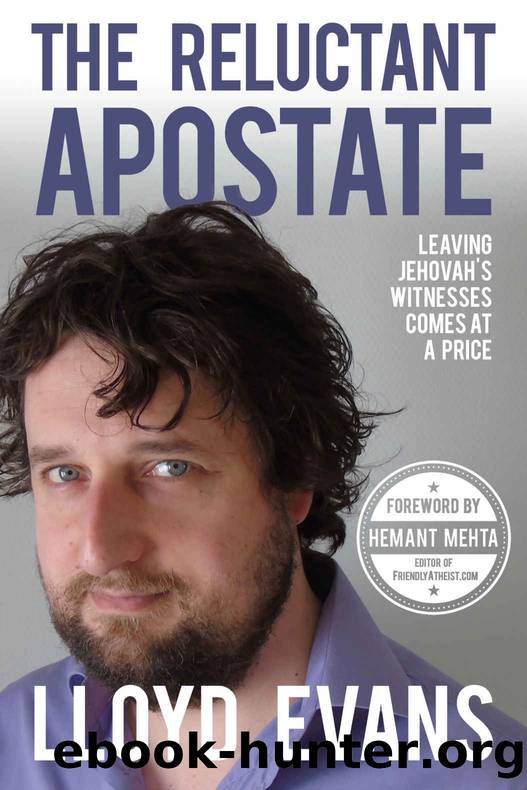The Reluctant Apostate: Leaving Jehovah's Witnesses Comes at a Price by Lloyd Evans

Author:Lloyd Evans [Evans, Lloyd]
Language: eng
Format: azw
Publisher: JLE Publishing
Published: 2017-02-01T16:00:00+00:00
Mexico and Malawi
Jehovahâs Witnesses pride themselves on maintaining strict political neutrality in the spirit of Christâs words to Pilate that his Kingdom is âno part of this world.â This has resulted in young Witness men over many decades enduring long periods of imprisonment in countries where conscription is in force. For example, in South Korea, Witnesses are willing to spend up to 18 months in prison in order to avoid military service, even though the country already allows for non-combative service.[223] According to Watchtowerâs logic, a Witness who submits to the one month of combat training required for South Korean conscripts (presumably scrambling around in mud and learning how to clean, assemble and fire a weapon) is violating Isaiah 2:4, which demands that Christians should not so much as âlearn war anymore.â (Of course, the verse insists nothing of the sort but, as with many areas of its doctrine, Watchtower would rather go to extremes in enforcing its teachings than be seen to concede ground to âSatanâs worldâ in any way.)
Though Watchtowerâs strong doctrinal aversion to compromising political neutrality has generally been consistently maintained, there have been notable exceptions. One example is the organizationâs covert flirtation with the United Nations in the 1990s, which I will come to later. Another is the period in the â60s, â70s and â80s when Watchtower allowed two entirely contradictory standards to apply to two countries, namely Mexico and Malawi. In the latter country, Watchtowerâs policies resulted in Witnesses suffering horrendous persecution, including destruction of property, beatings, rape and murder.
Much of what we know about this matter is gleaned from Crisis of Conscience in a chapter titled âDouble Standards.â Thankfully, when compiling his material on the subject, Raymond Franz understood the importance of presenting documented evidence to prove what amounts to gross negligence, recklessness and hypocrisy on Watchtowerâs part. Photocopies of key branch correspondence in support of his claims are therefore furnished in his book.[224] What follows is therefore based on Franzâs evidence, at least as regards the situation in Mexico. The persecution in Malawi (and the reasoning behind it) is attested by Watchtowerâs own publications.
In Mexico, Witnesses had written to Watchtower requesting guidance on how to deal with difficulties presented by their refusal to undergo one yearâs military service. Only by fulfilling such service could a young man obtain a cartilla card (a certificate declaring one yearâs service complete), which enabled him to obtain a passport, driverâs license, and so forth. Without their cartillas, Mexican Witnesses were considerably restricted in how much they could provide for themselves, or engage in work for Watchtower.
Watchtowerâs solution to the problem was spelled out in a letter sent from Brooklyn to the Mexican branch dated June 2, 1960. It effectively allowed Witnesses to obtain their cartillas through bribery on condition that officials were âwilling to accept such an arrangement,â and provided âthe money paid does not go to the military establishment, but is appropriated by the individual who undertakes the arrangement.â
Apparently baffled by the latitude granted them by
Download
This site does not store any files on its server. We only index and link to content provided by other sites. Please contact the content providers to delete copyright contents if any and email us, we'll remove relevant links or contents immediately.
Jehovah's Witnesses & The Real Truth by winters Joseph(191)
Russian Nuclear Orthodoxy by Dmitry Adamsky;(185)
The Book of Mormon: A Very Short Introduction (Very Short Introductions) by Terryl L. Givens(167)
The Orthodox Faith Volume 3: Church History by Thomas Hopko & David C. Ford(159)
The Reluctant Apostate: Leaving Jehovah's Witnesses Comes at a Price by Lloyd Evans(150)
Mormon America - Revised and Updated Edition by Richard Ostling(149)
Watchtower Jehovah's Witness Teachings Examined (The WOW Self-help Series Of Natural Health Alternatives Book 3) by Knowles Norman(116)
Dialogue With A JW by Mitchell Sean(115)
